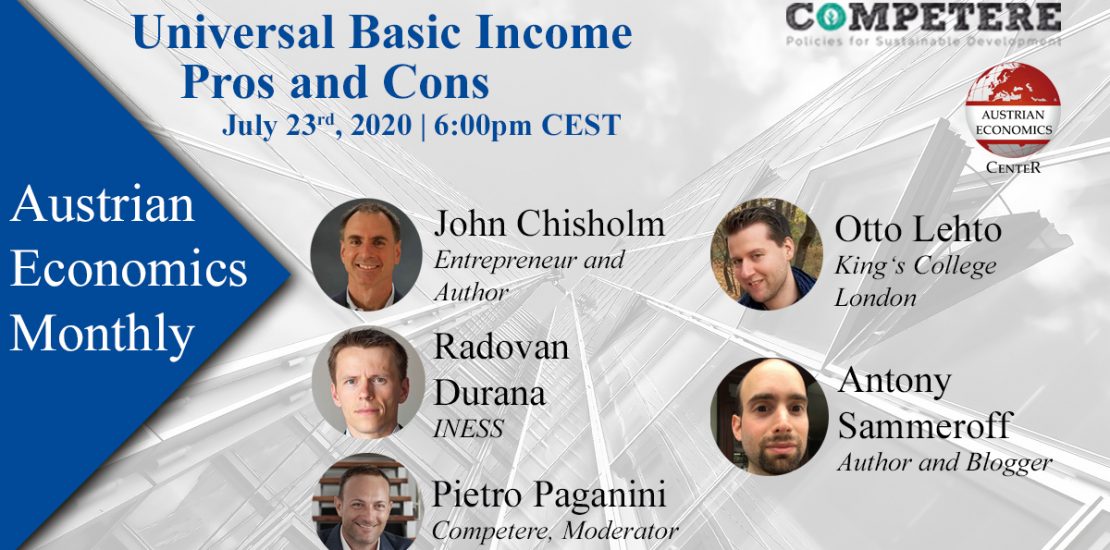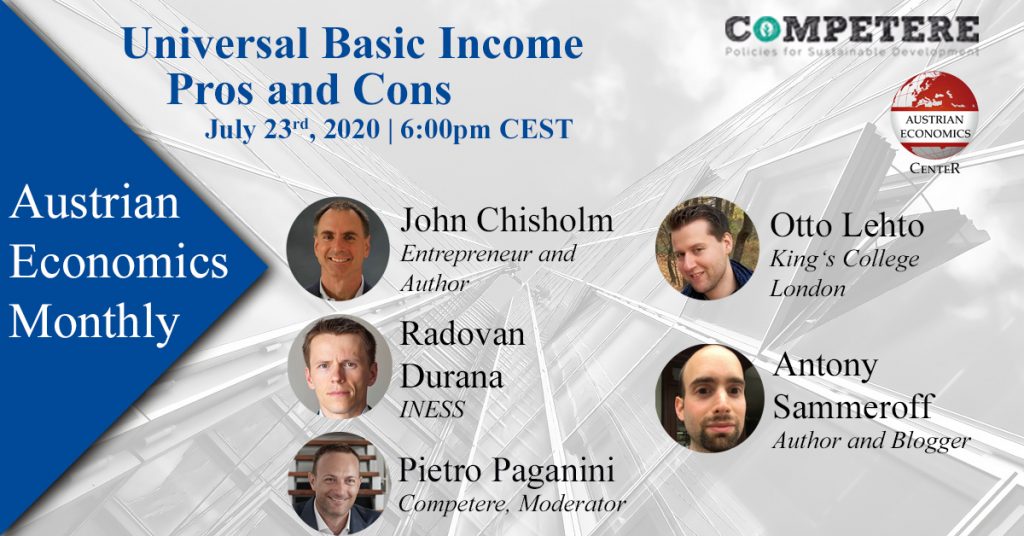Universal Basic Income: Pros and Cons – LIVE STREAM TALKUniversal Basic Income: Pros and Cons - 2nd Austrian Economics Monthly Webinar in collaboration with Competere
- 17 July 2020
- Posted by: Competere
- Categories: events, highlights, News

Universal Basic Income: Pros and Cons – LIVE TALK
in collaboration with Austrian Economics Monthly Webinar
The collaboration with the Austrian Economics continues on issues of major importance for the future of society.
We discussed about the Universal Basic Income, a topic that was addressed in the context of the Covid19 crisis as a possible welfare innovation measure.
The spread of COVID-19 has fundamentally shaken economies, and people are beginning to question existing economic models. This crisis poses several questions concerning the resilience of economies. For example, how much should you grow and produce locally to stay secure? While remaining globally interconnected, we’re learning the hard way that global supply chains are only as strong as their weakest link; when that link breaks, entire economies can collapse.
The appetite for UBI (universal basic income) is growing around the world – initial trials are underway. So, it is necessary to bring back a conversation about universal basic income, and to discuss about it from different perspectives. What does it mean for people? Would it be a concrete way to reduce inequalities and increase global welfare levels? Or is it just another form of unproductive welfare that will weaken local economy?
The webinar was attended by guests with great expertise on the subject:
John Chisholm has three decades of experience as entrepreneur, CEO, and investor. Today he is CEO of John Chisholm Ventures, a startup advisory and angel investing group. John is the author of Unleash Your Inner Company
Radovan Durana is a founding member of the Bratislava Institute INESS, analyzing public finances, social security and pension systems.
Otto Lehto is a political economist and philosopher at King’s College London, where he is currently writing his PhD thesis on Universal Basic Income and evolutionary economics.
Antony Sammeroff is the author of “Universal Basic Income — For and Against” and co-host of the Scottish Liberty Podcast.
MODERATION:
Pietro Paganini is the President and Curiosity Officer at Competere, and Prof. at Fox School of Business, Temple University of Philadelphia.
The highlights of the event “Universal Basic Income: Pros and Cons”
Otto Lehto
same amount the adult population, cash transfer regularly paid, a general grant that will replace a big part of welfare measures. At this moment, is worth considering. welfare states built after world war are facing challenges. Will reduce the burocracy of the paternalistic welfare state.
You need to set the rules of the game. You need to enforce them in some way.
Anthony
idea that people should attain a certain amount of money. The best argument in favor is that it could potentially cut down govt. bureaucracy. Skeptical that UBI can retain its uniformity, not sure that it is sustainable. What incentives for the govt to take advantage of this? Penalizing the basic income of everyone will be a method of control for the govt. if you do something wrong, you’ll get a fine. Govt. will start noggin people. Parallelism with social credit system in China. It will be another lever that govt. has over us.
Agree with John, massive reducing the price of goods and services giving more purchasing power. Govt. needs to act on those themes.
Radovan
Slovakia is one the few countries that has a sort of UBI already in place. It will not something that will be achieved and finished but will always be evolved. It is also dangerous in sustainability. In fact, during elections a politician might be interested in raise UBI of a certain amount, creating huge fiscal problems.
People seems wanting to leave in a fair economic system, different rewards for different people. In contrast with the idea of same rights and same benefits.
John
It seems that there are no enough resources to effectively implement the policy in US, it sounds ironic but most of the income will come from taxes from middle class. Much better neither tax neither redistribute. Keep the programs for those who need them. Non necessity to UBI. Led innovation and competition make products and other services more accessible.
During this pandemic, the thing would have helped most is if people would have saved most. It is a mindset. That used to be really important and that we are losing. This is because “I don’t have to save for a rainy day”.

